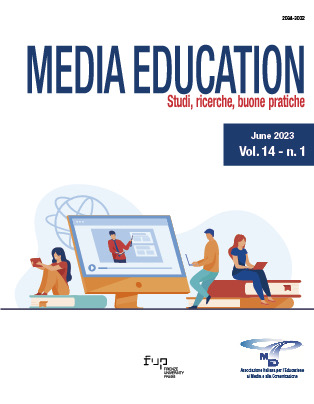Dal game-based learning ai serious games: alcune prospettive per l’apprendimento mediato dalla tecnologia digitale
Published 2023-01-30
Keywords
- Augmented reality,
- Media Education,
- Media Literacy,
- Game-based learning,
- serious games
Copyright (c) 2023 Marco Ciziceno

This work is licensed under a Creative Commons Attribution-NonCommercial-NoDerivatives 4.0 International License.
Abstract
In the last few years, serious games have become popular tools in media education, as they help engage and motivate students to learn. However, few studies investigate the long-term effects of game-based learning, and many scholars declare themself skeptical about the learning mediated by digital technology. This paper reflects on the importance of new media and serious games for young people belonging to the Net Generation as defined by Prensky. I support the idea that game-based learning reflects a broader change in our society, coinciding with the rise of the phenomenon of gamification and the sociological paradigm of Homo Ludens. Apart from the limitations of technology-mediated learning, the paper outlines possible and new directions for serious games in educational and professional contexts.
References
Bateson, G. (1958). Naven: A survey of the problems suggested by a composite picture of the culture of a New Guinea tribe drawn from three points of view (Vol. 21). Stanford University Press.
Caillois, R. (1958). I giochi e gli uomini. (Trad. IT.) Milano, Bompiani, 1981.
Cappello, G. (2010). Analisi critica vs. produzione creativa. Le nuove sfide della media education nell’era digitale. Form@ re-Open Journal per la formazione in rete, 10(70), 37-44.
Cappello, G. (2015). Media/Digital Competence. The European and Italian Definition. In Anderle, M., Ring, S. (Ed.) Gamepaddle : video games, education, empowerment (pp. 66-75). Milano, Ledizioni. http://digital.casalini.it/9788867054091
Cappello, G. (2017). Literacy, Media Literacy and Social Change. Where Do We Go From Now?. Italian Journal of Sociology of Education, 9(1), 31-44. doi: 10.14658/pupj-ijse-2017-1-3.
Caruso, S. (2012). Homo oeconomicus: paradigma, critiche, revisioni: saggio sui (discutibili) presupposti antropologici della razionalità utilitaria e sulle implicazioni ideologiche della loro entificazione. Firenze, Firenze University Press.
Charsky, D. (2010). From edutainment to serious games: A change in the use of game characteristics. Games and Culture, 5(2), 177–198.
Dewey, J., (1933). John Dewey the Later Works. (Trad. IT.) Monroy, A. G. (1961). Come pensiamo. La nuova Italia, Roma.
Erikson, E. H. (1968). Identity: Youth and crisis. New York, NY, WW Norton.
Fleming, T. M., Bavin, L., Stasiak, K., Hermansson-Webb, E., Merry, S. N., Cheek, C., ... Hetrick, S. (2017). Serious games and gamification for mental health: current status and promising directions. Frontiers in Psychiatry, 7, 215. doi: 10.3389/fpsyt.2016.00215.
Galante, L. C., Michelis, P. (2007). Gli insegnanti non insegnano gli studenti non imparano. Analisi di un paradosso relazionale. Modello d'intervento di consulenza in psicologia clinica. Milano, FrancoAngeli.
Gallese, V., Sinigaglia, C. (2011). What is so special about embodied simulation?. Trends in cognitive sciences, 15(11), 512-519.
Hamari, J., Lehdonvirta, V. (2010). Game design as marketing: How game mechanics create demand for virtual goods. International Journal of Business Science & Applied Management, 5(1), 14-29.
Hirschman, A. (1958). The Strategy of Economic Development. Yale University Press, New Haven, CT.
Huizinga, J. (1938). Homo Ludens. (Trad. IT.) Torino, Einaudi, 1949.
Kato, P. M. (2010). Video games in health care: Closing the gap. Review of general psychology, 14(2), 113-121.
Kranzberg, M., (1986). Technology and History: Kranzberg’s Laws. Technology and Culture, 27(3), 544–560.
Leonzi, S. (2017). La condizione transmediale, In Bernardo N., (Ed.) Transmedia 2.0: Brand, Storytelling, Entertainment, (pp. 7-25). Roma, Armando Editore.
Lévy, P. (1996). L'intelligenza collettiva. Per un’antropologia del cyberspazio. Feltrinelli Editore, Milano.
Limone, P. (2012). Ambienti di apprendimento e progettazione didattica. Proposte per un sistema educativo transmediale. Carocci Editore, Roma.
Lo Verde, F. M. (2014). Sociologia dello sport e del tempo libero. Bologna, Il Mulino.
Maree, J. G. (2021). The psychosocial development theory of Erik Erikson: critical overview. Early Child Development and Care, 191(7-8), 1107-1121.
Marrone, M., Peterlongo, G., Pirina, G. (2021). La classe operaia va nel cyberspazio. Il capitalismo di piattaforma oltre i miti della digitalizzazione. Economia e Società Regionale, 1, 127-151. doi: 10.3280/ES2021-001011.
Mascheroni, G., Livingstone, S., Dreier, M., & Chaudron, S. (2016). Learning versus play or learning through play? How parents’imaginaries, discourses and practices around ICTS shape children’s (digital) literacy practices. Media Education, 7(2), 242-261.
Mead, G.H. (1934). Mente, sè e società. (Trad. IT.) Giunti, Firenze, 2010.
Milanesi, R., Morreale, D. (2021). Alternate Reality Game: costruire mondi possibili per un futuro migliore. Milano, FrancoAngeli.
Mori, L. (2012). Serious games e simulazione come risorse per l’educazione. Meta: Research in Hermeneutics, Phenomenology, and Practical Philosophy, 4(1), 56-72.
Paciaroni, M. (2008). Gioco, virtualità, simulazione. Nuove prospettive tra cultura videoludica e apprendimento. EUM edizioni Università di Macerata.
Possenti, V. (1989). Techne: dai greci ai moderni e ritorno. Rivista Di Filosofia Neo-Scolastica, 81(2), 294–307. http://www.jstor.org/stable/43061908.
Prensky, M. (2001). Digital Natives, Digital Immigrants. On the Horizon, 9(5), 1-6.
Prensky, M. (2003). Digital game-based learning. Computers in Entertainment (CIE), 1(1), 21-21.
Reich, H., Di Rosa, R. T. (Eds.) (2021). Newcomers as agents for social change: learning from the Italian experience: a recourse book for social work and social work education in the field of migration. FrancoAngeli, Milano.
Resnick, M. (2004). Edutainment? No Thanks. I Prefer Playful Learning, Associazione Civita Report on Edutainment (last access: 2022).
Robins, K., Webster, F. (Eds.) (1999). Times of the Technoculture: From the Information Society to the Virtual Life. London-New York, Routledge.
Sgambelluri, R. (2015). Il gioco come strumento di cura educativa: cenni storici e codici pedagogici a confronto. Formazione & Insegnamento, 13(2), 73-80. doi: 107346/-fei-XIII-02-15_08.
Wiggins, B. E. (2016). An overview and study on the use of games, simulations, and gamification in higher education. International Journal of Game-Based Learning (IJGBL), 6(1), 18-29.
Zichermann, G., Cunningham, C. (2011). Gamification by design: Implementing game mechanics in web and mobile apps. O'Reilly Media, Inc., Canada.

